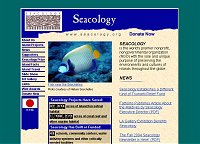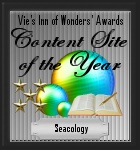Vie's Inn of Wonders' Awards
Rewarding excellence in Content...
Interview CSOTY 2004-winner
We are very pleased to have with us Emily Klokkevold, Webmistress of Seacology, that won our Content Site of the Year-award 2004...
Emily, How did you get involved in ecology, or should I say Seacology?
Emily, How did you get involved in ecology, or should I say Seacology?
Emily Klokkevold: I have always been concerned with our natural environment and the monumental problems occurring in it that seem to be going on largely unnoticed, or at least uncared for.
I majored in Environmental Sciences at Northern Arizona University in Flagstaff, Arizona, USA. Upon returning home to the San Francisco Bay Area, I found this job opening in Berkeley, California with Seacology.
Seacology is unique in that it is a small non-profit environmental organization that works directly with islanders to find out what they need in exchange for protecting areas of marine or terrestrial habitat on their islands.
From the beginning of a project, all the work is done locally by the islanders using their contributions and support and therefore the projects are lasting. We are also a very small organization (only 5 full-time staff) with little overhead or bureaucracy, meaning that most of the money we receive in donations goes directly to our projects.
Seacology was exactly the kind of place where I wanted to work. I wanted to feel like I was contributing to something positive and by working for Seacology I feel like, in some way, I'm doing that.
This must indeed be very nice...Now what are you trying to accomplish with your website?
Emily: The Seacology website is trying to raise awareness about the danger that islands face in the world today, with rising sea levels due to global warming and the destruction of rain forests and coral reefs.
The website then gives people the opportunity, through donations, to help Seacology be a piece of the solution to these problems. Additionally, to give people an idea of how their donation would be used, we show what projects have been launched by Seacology, including frequent updates and photos showing how each project is progressing.
Impressive... Do you notice any improvement in human awareness for ecology in the world today?
Emily: Definitely. I believe that people, both in industrialized and developing worlds, are understandably more concerned with their immediate surroundings and welfare than they are with the general global environment.
However, the health of the world has impacts on all of us, if not noticeably now, then as it degrades, definitely in the future. We often take for granted our supply of water and food, or the open spaces that most of us enjoy going to for a vacation or just to relax. These things may not always exist in endless supply. We must take care of the world that provides us with these things that are vital to our survival and happiness.
We live in one big ecosystem that has a delicate balance. Remove or damage a piece of that puzzle and the others will feel it.
Very true indeed! Now if we all should want to help, what do we need to do or pay attention for?
Emily: There are many things that an individual can do to protect the environment, and more specifically island habitat and species. I believe that the number one thing for people in industrialized countries to do would be to just consume less.
Willingness to pay for a product means that product will be produced, and natural resources will be used. Coral reefs and rain forests are being destroyed because it is profitable to do so. As habitats, they are less important to some people than the money that can be earned from the sale of fish or shrimp and hard woods.
However, not all fish, for example, are harvested in ecologically destructive ways, so it is important when you do make purchases to be aware of where the product came from and how it was harvested, in addition to knowing whether it was harmful to harvest it at all. (For ecological info on seafood, this site (opens in new window) has an informative wallet sized card that can be downloaded.)
Additionally, if a person has the monetary resources, donating to Seacology or other equally efficient organizations does make a difference. With help, we can provide islanders with the things they need such as schools, water delivery systems, or community centers without them having to sacrifice the environment by resorting to a developer's money.
That's very useful to know. And is receiving recognition (as awards) useful to you?
Emily: I suppose somewhat. It's nice to know that other people think the work you are doing has value. The real reward I get from working on this website, though, is just knowing that people are being informed of the problems, can see the part Seacology is playing in solving them, and then, as individuals, can help Seacology in its efforts.
Thank you, Emily Klokkevold, and I wish you and your wonderful site all the best in the future...
![]() *
*
Intro ![]() Disqualifiers
Disqualifiers ![]() Criteria
Criteria ![]() Graphics
Graphics ![]() Self Test
Self Test ![]() Application
Application ![]() Winners*
Winners*
Status ![]() Statistics
Statistics ![]() Evaluator
Evaluator ![]() Affiliations
Affiliations ![]() Ethics
Ethics ![]() Privacy
Privacy ![]() Copyright
Copyright ![]() Site Map
Site Map

